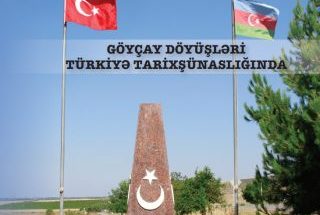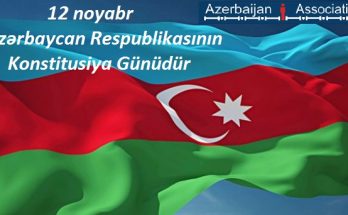 Interview with senior consultant at Ukraine-based National Institute for International Security Studies Elena Kotelyanets.
Interview with senior consultant at Ukraine-based National Institute for International Security Studies Elena Kotelyanets.
Do you believe the intensified negotiations on Nagorno-Karabakh conflict will have a real impact on speedy resolution of the conflict?
Intensification of the Nagorno-Karabakh negotiations was consequence of new geopolitical realities in the South Caucasus that emerged in aftermath of the war in August 2008. The possibility of another war in the Caucasus due to the unresolved issue of Nagorno-Karabakh conflict pushed the region as well as external players (EU and the U.S.) to correct security system in the subregion, including a more active search for a peaceful solution to the Karabakh conflict.
Moreover, a desire to achieve dominance in the South Caucasus encourages members of the Minsk Group as well as Turkey to compete for an initiative to organize Armenian-Azerbaijani high-level meetings on settlement of the Nagorno-Karabakh problem. Over the past year, presidents of Armenia and Azerbaijan held six round of talks, the outcome of which remains unknown.
However, this activity by the Armenian and Azerbaijani sides and foreign players’ open interest in intensification of settlement process most likely will accelerate a search for compromise solutions to the Nagorno-Karabakh conflict or at least create preconditions for a consensus between the parties in the most pressing issues. Also, it is hoped that this process will facilitate creation of effective mechanisms to prevent new armed clashes in the South Caucasus.
Armenia may waive the Turkish-Armenian protocols in case of their delayed ratification by the Turkish Parliament. How will the leading world powers respond this ? What is your opinion about this possible move by Armenia?
Taking a step towards normalization of relations, Armenia and Turkey are very conscious that the old nature of bilateral ties do not meet requirements of the current situation in the region and neither did it correspond global and regional political trends, and most importantly – the national interests of those states. Unresolved questions – a relationship with Azerbaijan, in the context of solving the Nagorno-Karabakh conflict for Turkey and dissident part of society inside the country and the diaspora – for Armenia serve as pitfalls on a way to final settlement of the Armenian-Turkish relations.
Regarding Armenia’s possible refusal to ratify the protocols, this step will bring rather great losses to Yerevan than dividends. Reopening of borders with Turkey is very important for Armenia for the following reasons: this is a way out of years of isolation, a productive way to address the dire economic situation that was deepened by the global financial crisis, an effective integration into the regional economy as well as increased geopolitical position as a whole.
The leadership of both countries will make every effort to ratify the protocols in their parliaments as a huge work done and also national interests of both countries stand behind this. Moreover, world’s leading states are interested in normalization of Armenian-Turkish relations and will make maximum efforts to ensure successful completion of this process.
Iran intends to begin implementing simplified visa system with Azerbaijan next year. Moreover, Azerbaijan and Iran recently signed an agreement to supply gas to Iran. Do you think that these actions point to certain rapprochement between the countries? Does it somehow impact the Armenian-Iranian relations?
Iran’s decision to unilaterally abolish visa regime with Azerbaijan fully meets Iranian regional interests. This step by Tehran can be viewed as a timely and sensible thing to do. It is mainly due to the process of normalization of Armenian-Turkish relations. The prospect of normalization of interstate relations between Armenia and Turkey and a possibility of Turkey’s gaining position in the South Caucasus compelled Iran to become more assertive. Cancelling visa regime means Iran’s willingness to fight with Turkey for Azerbaijan not on political, diplomatic or military arenas, but in demographic, cultural and religious areas.
Azerbaijan’s quite restrained reaction to Iran’s actions may indicate an awareness of possible risks from simplification of visa regime between the countries. Primarily, it concerns an uncontrolled flow of refugees (Iranian Azerbaijanis) to the territory of Azerbaijan as a result of possible military action against Iran. Such a situation can lead to inevitable humanitarian crisis in Azerbaijan. Internal destabilization involving ethnic problems provoked by external forces is also dangerous for Azerbaijan.
Thus, establishment of relations between Iran and Azerbaijan can be explained by a desire of both countries to control the possible risks to their safety, regardless of alignment of forces and developments in the region. Concerning the development of Armenian-Iranian relations in connection with normalization Azerbaijan-Iran relations between, we should not expect them to deteriorate. Teheran has been an ally of Yerevan throughout the history of Armenia’s independence. Moreover, given virtuosity of Iranian diplomacy, we should expect a flexible policy by Iran towards both Azerbaijan and Armenia.
During his U.S. trip, Turkish Prime Minister Erdogan criticized the OSCE Minsk Group, urging them to show will to resolve the Nagorno-Karabakh conflict. In your opinion, what can really make the OSCE Minsk Group to accelerate the process of resolving the conflict?
Velocity of settlement of Nagorno-Karabakh conflict will largely depend on fate of the Armenian-Turkish protocols. Their ratification in near future may give impetus to solution of the Karabakh problem whereas further delay will be an obstacle for future Armenian-Azerbaijani negotiations on this issue. Not the Minsk Group, but flexibility of the conflicting positions, as well as interested parties to the conflict can speed up the settlement process. There is no unanimity concerning various components of settlement of the Karabakh conflict while is a consensus among the major global players about opening of borders and establishing diplomatic relations between Armenia and Turkey.
How can you comment on U.S. Congress efforts to allocate $8 million in assistance to the break-away Nagorno-Karabakh in 2010? Do you think it is right to provide direct assistance to Karabakh separatists?
Providing direct financial assistance to separatist republics is misconduct, and this applies not only to the U.S. actions in relation to the Nagorno-Karabakh. Until recently, financing separatist republics has been raised repeatedly and criticized by international community in connection with Russia’s financial assistance to Abkhazia and South Ossetia. Such actions by the United States and Russia can be seen by other countries as a norm of international politics, a fact of open support of separatism and quite a dangerous precedent for formation of an area of stability and security in the multinational regions, particularly in the South Caucasus.
The U.S. financial assistance to Nagorno-Karabakh population shows a strong Armenian lobby in the U.S. Congress. Despite reduction of expenditures on foreign policy programs, as well as Barack Obama’s suggestions to cuts in next year’s aid to Armenia by 38 percent, it will remain the same – $ 48 million and the amount of aid to Nagorno-Karabakh will increase up to $10 million compared with the last year’s amount.
Day.az



